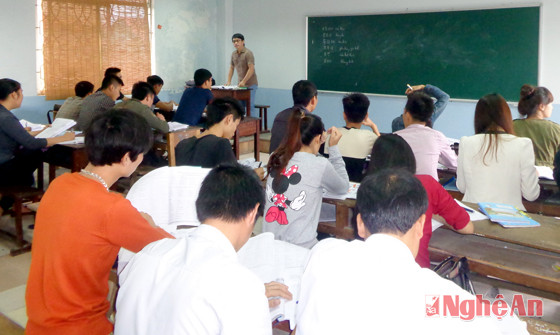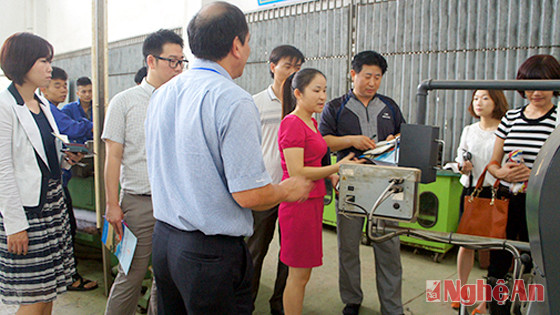Teaching Korean: Opportunities and Challenges
(Baonghean) - Currently, as Korean investment projects in Nghe An province are increasing, the Korean labor export market is expanding, leading to an increase in demand for learning Korean. Therefore, in Nghe An, Korean language teaching is a promising profession!
 |
| Korean language class at Vietnam - Korea Vocational College of Technology (Vinh City). |
Where there is demand, there is supply.
At the Vietnam - Korea Industrial Technical Vocational College (abbreviated as Vietnam - Korea School), Korean language has been officially taught since 1999. However, it was not until recent years, when Korea became one of the leading important economic partners of Vietnam, the demand for learning Korean grew strongly, teaching Korean became a "hot" profession, bringing great job opportunities and high income. Korean teachers sometimes earn 20-25 million VND/month. Up to now, in Nghe An, in addition to the Vietnam - Korea School, some other facilities such as the Vocational College No. 4 of the Ministry of National Defense (Nghi Phu, Vinh City), the Job Introduction Center (Department of Labor, Invalids and Social Affairs) also organize Korean language teaching.
Ms. Nguyen Thi Thu Hoai, Trung Do Ward (Vinh City), graduated with a bachelor's degree in Korean language (Hanoi University of Foreign Languages), a Korean language teacher at the Vietnam - Korea School, said that the school currently has 4 Korean language teachers on staff. Due to the huge demand for Korean language registration at the school, the 4 official teachers cannot meet the demand, the school had to sign a contract with up to 20 Korean language teachers. Along with that, the school also cooperates with 15 Korean volunteers who are always ready to meet the needs of students learning Korean.
The subjects of Korean language classes are quite diverse: full-time college and vocational secondary school students of the school, studying Korean as a compulsory foreign language; people who want to export labor to Korea. According to the Employment Permit Program (EPS) for Vietnamese workers working under fixed-term contracts in Korea, the condition for these workers is to pass the Korean language test for labor export (ESP-TOPIK) to be accepted. Therefore, the demand for learning Korean from these subjects is very large. At one point, at the Vietnam - Korea school, there were 1,500 labor export people registered to study Korean. The school had to organize more than 40 classes, teaching continuously 3 shifts/day. The third subject is advanced Korean language training under the orientation education program for those who have passed ESP-TOPIK and are about to leave the country. In 2014, the Vietnam - Korea School was one of two centers nationwide chosen to organize orientation training courses, so in June - July 2014, nearly 1,000 students nationwide participated in these training courses. The fourth group is managers of Korean-invested enterprises who need to use Korean in their work. In Nghe An, there are currently 8 Korean enterprises operating and a large number of managers who need to learn Korean. Another group is those who want to go to Korea to study abroad, this number has increased significantly in recent years. In addition, some students are students who come to Korean classes simply because they love Korean culture or Korean songs; others learn Korean to "become a bride in a foreign land".
The form of Korean language teaching is also quite diverse. In addition to studying at Korean language centers, students can take tutoring classes at home or if they have better conditions, they can choose to be tutored or taught at home. Mr. Ho Van Giap - Manager of Vinh University Tutoring Center said: "From 2010 to now, the Center has added Korean language teaching, the number of students coming to the center has increased. In 2014, the center had about 10 students each month, most of whom were young people who wanted to study abroad in Hanoi.n Country”.
 |
| Korean teacher interprets for KOICA delegation (Korea) at the lathe practice room of Vietnam - Korea Vocational College of Technology. |
Opportunities and challenges
Ms. Nguyen Thi Thu Hoai also said that currently, students who graduate from teaching Korean language have many job opportunities. Many graduates choose to work at the offices of Korean companies. Korean enterprises in Nghe An in their recruitment notices all have the line "priority for those who are fluent in Korean". In addition, the group of Korean language teachers of the Vietnam - Korea school is also often invited to interpret whenever a Korean delegation visits and works in Nghe An. Working sessions of diplomatic delegations, Korean delegations, of localities with the province, with localities in the province (such as Gyeongi province, Nam Yangju city); Korean business delegations and enterprises from other places coming to Nghe An to work also regularly contact Korean language teachers to ask for interpretation upon request. On average, each day of interpretation is paid no less than 100 USD; The salary of Korean translators at Korean companies starts at around 300-400 USD/month, increasing by 100 USD/year and the current average income of Korean translators is around 600-800 USD/month. Ms. Hoai also added that compared to Latin languages, Korean is easier to learn, can be spelled and rhymed like Vietnamese; Korean has a large Chinese vocabulary, so many people only need to study for 1 year to be able to communicate fluently with Koreans.
In addition to the above factors, Korean language teaching in the province also has many other favorable conditions for development. Currently, Korea is the country with the largest number of investment projects in Nghe An. Up to now, there are 11 valid investment projects, with registered capital of 60.97 million USD, employing over 10,000 local workers. Typical examples include the Hitech BSE Vietnam Electronics and Telecommunications Components, Equipment and Electronics Factory established by BSE Vietnam Electronics Co., Ltd. in Nam Cam Industrial Park, with a total investment of 30 million USD, a scale of 250 million products/year; Haivina Kim Lien Garment Factory (Nam Dan) with a total investment of 5 million USD, specializing in the production and processing of sports gloves and industrial gloves with an output of 3.5 million pairs/year; Prex Vinh Company Limited's leather and textile factory, with an investment capital of 11.6 million USD, specializes in manufacturing textile products, swimwear, leather products, clothing accessories, with an output of 3 million products/year; Nam Sung Vina Company Limited's ready-made garment and costume factory invested in by the Hong Ky Tower Industrial Park (Dien Chau), with a total investment of 7 million USD, with an output of 9,480,000 products/year.
Korean enterprises in Nghe An have established a Korean Business Club to support and exchange experiences with each other in the process of implementing investments in Nghe An. At the Vietnam - Korea School, out of the total 6 million USD that the Korean Cooperation Organization (KOICA) will invest in the school in the coming time, in addition to the cost of building factories and purchasing equipment, 1.4 million USD will be spent on opening training classes for managers, teachers, and experts of the school in Korea with a number of nearly 60 people. Currently, the Vietnam - Korea School also has a contract with Yangsan University (Korea) to teach and grant additional Korean language degrees. This is a favorable condition to promote economic cooperation between Vietnam and Korea, opening up many opportunities for the development of the Korean language teaching profession.
However, teaching Korean is currently facing many challenges. Before 2011, the demand for learning Korean to work abroad in the province was very high, leading to a situation of "supply not meeting demand". However, from December 2011 to December 2013, Korea temporarily suspended Korean language exams to limit the acceptance of Vietnamese workers. The reason is that the number of Vietnamese workers residing illegally was at the highest level among the 15 countries whose citizens are working under fixed-term contracts in Korea. Therefore, teaching Korean in the province during that period was quite quiet. Earlier this year, when the ESP program to send Vietnamese workers to work in Korea resumed, the demand for learning Korean in this group increased. However, most of those who want to work abroad and attend Korean language classes often choose large, quality centers. Therefore, some small-scale Korean language centers are currently seriously lacking students. At the Provincial Employment Center, according to Mr. Le Van Thanh - Deputy Head of the Training Department, "Before 2012, the Center's Korean language classes attracted 50-60 students each year. In recent years, there have only been more than a dozen students each year."
Up to this point, we have not yet “escaped” the risk of losing the Korean labor market, because the rate of Vietnamese workers residing illegally in Korea remains high. According to Mr. Le Huy Vinh - specialist of the Department of Labor - Employment (Department of Labor, War Invalids and Social Affairs), currently, the rate of Vietnamese workers residing illegally in Korea is 36.6%; in Nghe An province alone, it is more than 48%. Meanwhile, according to the terms of the agreement, the EPS program will only be resumed when the rate of Vietnamese workers residing illegally in Korea by December 2014 falls below 30%.
According to Mr. Dang Cao Thang - Deputy Director of the Department of Labor, War Invalids and Social Affairs, in order to reduce the rate of Vietnamese workers residing illegally in Korea, facilitate the continued implementation of the EPS program and also facilitate the teaching of Korean in Vietnam in general and Nghe An in particular, in the coming time, we must actively implement measures to mobilize illegal workers to return home. In the long term, we need to propagate so that exported workers do not stay illegally. This responsibility lies primarily with Korean language teachers. We must both teach Korean and at the same time propagate to raise awareness of law enforcement at the place of employment in accordance with the contract. In addition, families and society also need to actively participate in propagating and mobilizing exported workers not to "abandon the bowl and the tray", not to lose the opportunities of many others just for their own illegal interests...
Minh Quan - Duc Duong


